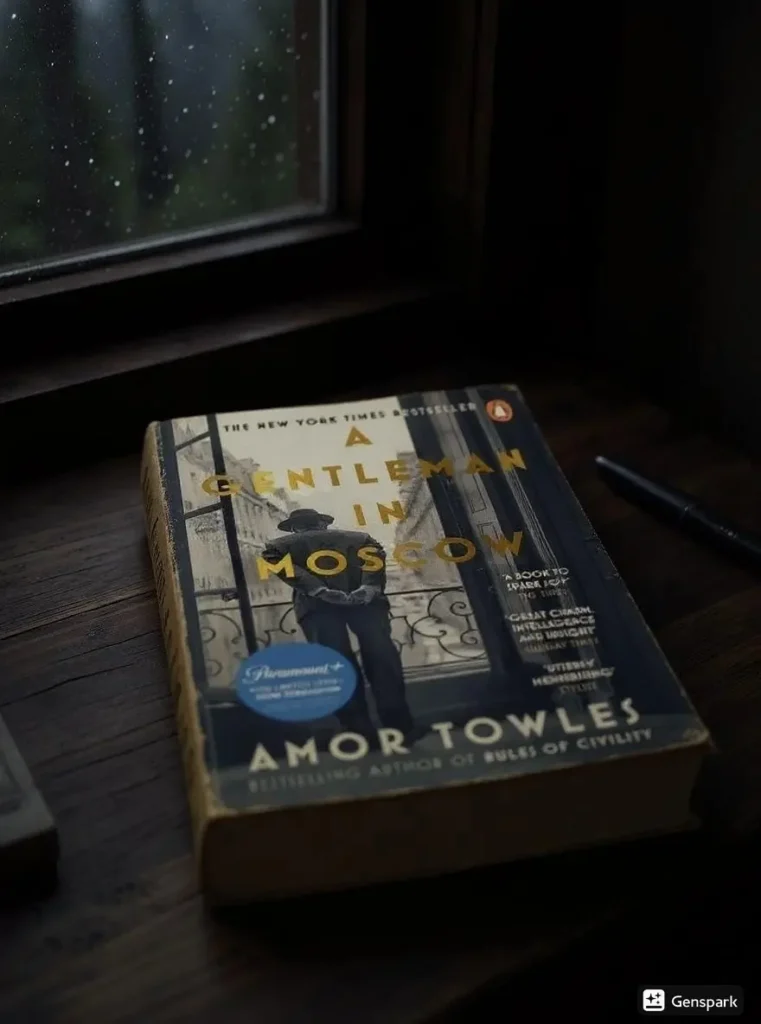I picked up A Gentleman in Moscow after hearing the literary community rave about this mega-bestseller with more than 2 million readers for years. Count Alexander Ilyich Rostov, born in Saint Petersburg on October 24, 1889, immediately captured my attention when I learned about his extraordinary predicament. Here’s a Russian aristocrat sentenced to indefinite house arrest in Moscow’s Hotel Metropol in 1922, and somehow Towles transforms this confined existence into a story that left me completely absorbed.
This Russian aristocrat living under house arrest in a luxury hotel for 30 years represents everything I love about character-driven historical fiction. After reading over 3,000 novels in my reviewing career, I can say this book stands apart from typical historical fiction because it refuses to let confinement diminish its protagonist’s spirit. The book manages to be a little bit of everything – fantastical romance, politics, espionage, parenthood, and poetry, which initially made me skeptical about its focus.
I spent countless evenings reading this in my favorite armchair, often staying up past midnight because Towles crafted scenes that demand immediate attention. The Count’s dignity under impossible circumstances mirrors the grace I’ve witnessed in my own elderly relatives who faced hardship with unshakeable poise. This book exceeded my expectations by proving that physical freedom matters far less than intellectual and emotional liberation. Finally, I have understood that why Microsoft founder Bill Gates recommended this book in 2019.
Key Takeaways
A true aristocrat’s character emerges not through privilege but through how he treats others when stripped of everything. The Count’s interactions with hotel staff, particularly his friendship with the head waiter, show authentic humanity transcending class boundaries.
Confinement can paradoxically expand rather than limit one’s world when approached with curiosity and adaptability. Rostov transforms his hotel prison into a universe of relationships, learning, and personal growth that many free people never achieve.
Revolutionary periods create unexpected opportunities for human connection across ideological divides. The Count’s relationships with Bolshevik officials demonstrate how personal respect can bridge seemingly impossible political gaps.
Children possess the power to completely reshape adult perspectives and priorities. Rostov’s relationship with young Sofia transforms him from a refined observer into a protective father figure willing to sacrifice everything.
History’s grand narratives often obscure individual stories of resilience and dignity. Towles reminds us that personal grace and kindness continue mattering even when the world appears to be falling apart.
Basic Book Details
Publishing Information: September 6, 2016 by Viking (Hardcover), 2017 by Penguin Books (Paperback)
Genre: Historical Fiction
Plot: Count Rostov, sentenced to life imprisonment in the Metropol hotel, 1922, must adapt to Soviet society while maintaining his aristocratic dignity
Series Information: Standalone novel (Towles’ second book after Rules of Civility)
Page Count: 462 pages
Main Characters:
- Count Alexander Rostov: Russian aristocrat under house arrest who maintains dignity through service and relationships
- Nina Kulikova: Precocious young girl who becomes the Count’s first friend in the hotel
- Sofia: Nina’s daughter who becomes the Count’s ward and transforms his purpose
- Mishka: The Count’s old friend and fellow poet who represents intellectual resistance
Plot Summary And Historical Context
Count Rostov’s House Arrest And The Metropol Hotel Setting
The Bolshevik tribunal’s decision to confine Count Rostov to the Hotel Metropol instead of executing him creates the novel’s entire foundation. I found this premise absolutely brilliant because it forces aristocratic privilege into direct contact with revolutionary reality. The Count must surrender his luxury suite for a cramped attic room, symbolically representing the broader social upheaval.
Towles transforms the Metropol into a microcosm of Soviet society itself. The hotel’s restaurants, bars, barbershop, and staff quarters become entire worlds for the Count to navigate. I was particularly struck by how the author uses architectural details – the hotel’s grand staircase, hidden passages, and rooftop access – as metaphors for the Count’s psychological journey through confinement.
Revolutionary Russia Backdrop And Bolshevik Tribunal Dynamics
The 1922 setting places us right in the heart of post-revolutionary chaos when the old order faced complete destruction. Towles writes with grace and verve about the mores and manners of a society on the cusp of radical change, capturing both the brutality and idealism of the period. The Count’s house arrest reflects the Bolsheviks’ complex relationship with aristocratic culture – they despised it yet remained fascinated by its refinement.
I appreciated how Towles avoids simplistic portrayals of revolutionary politics. The Bolshevik officials who visit the Count are neither cartoonish villains nor heroes – they’re complex individuals navigating their own challenges in creating a new society. This nuanced approach made the historical backdrop feel authentic rather than contrived.
Character Development And Relationship Analysis
Count Alexander Rostov’s Aristocratic Dignity Under Confinement
The Count had grown up knowing only the highest standards of etiquette and what it was to be a gentleman, from which he then imparts this knowledge upon anyone wishing to learn around him. What amazed me most was watching Rostov’s character evolve without ever betraying his core principles. He adapts to working as a waiter without losing his essential dignity.
The Count’s internal monologue reveals a man wrestling with purposelessness who gradually discovers meaning through service to others. His relationship with the hotel’s head waiter, Andrey, particularly moved me because it shows how mutual respect transcends traditional class boundaries. These aren’t superficial character changes – they represent genuine personal growth.
Rostov’s relationship with alcohol also fascinated me. His sophisticated palate becomes both a connection to his past life and a bridge to building relationships with hotel guests. Towles uses the Count’s wine knowledge as a metaphor for how cultural refinement can survive political revolution.
Supporting Cast Dynamics From Nina To Sofia And The Triumvirate
Young Nina Kulikova bursts into the Count’s orderly world like a force of nature, demanding his attention and friendship. Their initial relationship reminded me of my own interactions with precocious children – simultaneously exhausting and invigorating. Nina’s energy and curiosity provide the perfect counterpoint to the Count’s measured refinement.
This charming, stylish and engrossing read features one of the most unforgettable fictional characters of recent times, and I believe this refers not just to the Count but to the entire cast. The “Triumvirate” – Andrey the maître d’, Emile the chef, and the Count – forms the emotional heart of the hotel’s operations. Their friendship develops organically through shared meals and mutual respect.
Sofia’s arrival as a young girl transforms the Count from observer to active participant in shaping the future. Watching him navigate fatherhood without traditional resources moved me deeply. Their relationship feels completely authentic, avoiding sentimentality while capturing genuine love.
Literary Style And Narrative Technique
Towles’s Prose Craftsmanship And Philosophical Interludes
Towles writes with remarkable precision and elegance that perfectly matches his protagonist’s refined sensibilities. The prose makes you want to sink into and live inside forever, creating an immersive reading experience that matches the Count’s own deep engagement with his surroundings. The author’s background in finance shows in his carefully structured sentences and logical progression of ideas.
The philosophical interludes never feel pretentious or forced. Instead, they emerge naturally from the Count’s circumstances and personality. I particularly enjoyed his reflections on time, routine, and the nature of imprisonment. These passages reminded me of the best Russian literature – deeply thoughtful without being heavy-handed.
Towles employs a third-person limited perspective that allows us complete access to the Count’s thoughts while maintaining narrative distance. This technique creates intimacy without claustrophobia, which mirrors the Count’s own experience of confinement.
Structural Elements And Chapter Title Symbolism
All the chapter titles start with “A” – not a small feat given there are a lot of chapters. This structural choice initially seemed gimmicky but actually reinforces the novel’s themes of order, repetition, and finding meaning within constraints. The Count himself appreciates such formal elegance.
A Gentleman in Moscow takes the shape of a diamond on its side, according to Towles himself. The narrative builds slowly, reaches an emotional peak, then resolves with careful precision. This structure mirrors classical musical composition, which suits the Count’s refined tastes perfectly.
The time jumps between chapters initially disoriented me, but I came to appreciate how they compress thirty years into manageable segments. Each section feels complete while contributing to the larger narrative arc.
Thematic Exploration And Cultural Commentary
Adaptation Versus Resistance In Soviet Society
The Count’s survival strategy involves adapting to new circumstances while preserving his core identity. This balance between flexibility and integrity resonated with me because it reflects challenges we all face during major life transitions. The Count doesn’t become a revolutionary, but he learns to find dignity within the new system.
The book reminds me in its overall theme of finding grace under pressure and maintaining humanity despite dehumanizing circumstances. The Count’s approach to Soviet ideology is neither acceptance nor rejection but rather a kind of parallel existence that acknowledges reality without surrendering personal values.
The novel suggests that true resistance sometimes looks like collaboration, while apparent compliance can mask deep subversion. The Count serves his Bolshevik guests with perfect courtesy while privately maintaining his aristocratic worldview.

Class Consciousness And Service As Subtle Subversion
Working as a waiter transforms the Count’s understanding of service from noblesse oblige to genuine human connection. I found this character development particularly compelling because it shows how forced humility can become authentic humility without losing dignity. The Count discovers that serving others well is its own form of aristocracy.
The relationship between the Count and his former barber, now the hotel’s head of maintenance, illustrates how revolution reshuffles social positions without necessarily changing fundamental human dynamics. Their interactions maintain mutual respect despite reversed circumstances.
Towles suggests that true refinement transcends social position. The Count’s gentle treatment of everyone from Communist officials to kitchen staff demonstrates that aristocratic values at their best involve responsibility toward others rather than privilege over them.
Pros
Character Development Excellence: The Count’s evolution feels completely organic and believable. Towles avoids dramatic personality changes while showing genuine growth through circumstance and relationship.
Historical Authenticity: The 1920s-1950s Soviet setting feels meticulously researched without becoming a history lesson. Political events impact the characters naturally rather than overwhelming the personal story.
Prose Quality: The book’s pleasures are in the details, layered with delicious, minute observation. Every sentence serves multiple purposes – advancing plot, revealing character, or building atmosphere.
Emotional Resonance: The relationships between characters develop with genuine warmth and complexity. Nothing feels forced or manipulative about the emotional connections.
Thematic Depth: Questions about dignity, adaptation, and resistance emerge naturally from the story rather than being imposed by the author.
Cons
Pacing Issues: The middle section occasionally slows down as Towles explores the Count’s daily routines in perhaps excessive detail. Some readers might find these passages tedious rather than meditative.
Limited Female Character Development: While Nina and Sofia are well-drawn, most female characters remain somewhat peripheral to the Count’s story. Anna Urbanova, despite her importance to the plot, never feels fully realized.
Occasionally Precious Tone: Towles sometimes indulges in overly refined language that can feel affected rather than authentic. The Count’s voice occasionally becomes more authorial than character-driven.
Historical Simplification: The novel’s focus on personal relationships sometimes glosses over the genuine brutality of the Stalinist period. The hotel becomes almost too insulated from external horror.
Predictable Resolution: The final escape sequence, while satisfying, follows fairly conventional thriller plotting that contrasts with the novel’s otherwise subtle approach.
Final Verdict
A Gentleman in Moscow succeeds brilliantly as both historical fiction and character study. This engaging, witty, charming, mischievous read deserves its many awards because Towles transforms a potentially limiting premise into an expansive exploration of human dignity and adaptability. The Count’s thirty-year confinement becomes a masterclass in finding freedom through acceptance rather than rebellion.
I finished this book feeling genuinely moved by the Count’s journey from purposeless aristocrat to meaningful contributor to his small community. The novel’s greatest achievement lies in demonstrating how personal grace can survive and even flourish under the most challenging circumstances. This isn’t just historical fiction – it’s a meditation on how we choose to respond to life’s inevitable constraints.
At Dionysus Reviews, we particularly value books that combine literary quality with emotional accessibility, and A Gentleman in Moscow delivers both. While the novel has minor flaws in pacing and scope, its strengths far outweigh any weaknesses. The Count’s story will stay with readers long after they close the book.
I recommend this novel to anyone who appreciates character-driven historical fiction, fans of Russian literature, and readers seeking stories about resilience and dignity under pressure. However, those preferring fast-paced action or gritty historical realism might find the book’s genteel tone less appealing.
Dionysus Reviews Rating: 7/10
Sip The Unknown—Discover Stories You Never Knew You’d Love!
Dionysus Reviews Has A Book For Every Mood
Biography & Memoir
Fiction
Mystery & Detective
Nonfiction
Philosophy
Psychology
Romance
Science Fiction & Fantasy
Teens & Young Adult
Thriller & Suspense
Frequently Asked Questions
What makes Count Rostov’s character so compelling throughout his decades of confinement?
The Count maintains his essential dignity while demonstrating remarkable adaptability to changing circumstances. His character combines aristocratic refinement with genuine humility learned through service to others. Rather than becoming bitter about his confinement, he discovers purpose through relationships with hotel staff and guests, particularly his surrogate daughter Sofia.
How does Towles handle the historical backdrop of Soviet Russia without overwhelming the personal story?
Towles integrates historical events naturally through their impact on hotel life and the Count’s relationships. Major political changes – Stalin’s rise, World War II, the Cold War – filter through personal experiences rather than lengthy exposition. The Metropol Hotel serves as a microcosm that reflects broader social changes while maintaining focus on individual human stories.
Why does the novel focus so heavily on seemingly mundane details of hotel life?
The detailed attention to daily routines, meals, and hotel operations reflects the Count’s own refined appreciation for life’s small pleasures. These details also demonstrate how meaning can be found in ordinary moments when extraordinary options are unavailable. The mundane becomes profound when it represents the entirety of one’s available world.
What role does the Count’s relationship with Sofia play in his character development?
Sofia transforms the Count from a sophisticated observer into an active participant in shaping the future. Becoming her guardian gives him genuine purpose beyond mere survival or personal refinement. Their relationship forces him to consider practical matters like education, safety, and preparing someone else for life in Soviet society.
How does the book’s structure with chapter titles all starting with “A” contribute to the overall narrative?
The alphabetical constraint mirrors the Count’s own situation – finding creativity and meaning within strict limitations. This formal restriction actually generates creative possibilities, just as the Count’s confinement leads to unexpected personal growth. The structure reinforces themes about working within boundaries rather than fighting against them.









